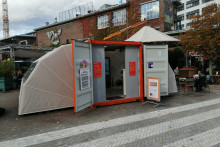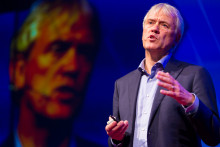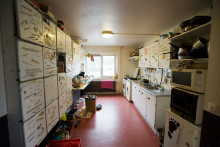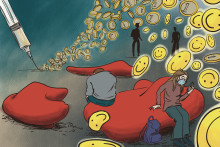EDUbox is a self-contained, off-grid and modular learning environment created by UT staff and students. ‘It is a combination of a lab and a classroom made out of a regular shipping container,’ says Alberto Martinetti, one of the project leaders and Associate Professor in Maintenance Engineering. ‘It is six meters long and 2,4 meters wide and it can host about ten students at the same time. It has to be foldable and energy independent, which is why we included solar panels, a battery pack that will allow to always produce some energy.’
Inclusive education
The EDUbox is part of an Orange Knowledge Programme TMT+ project, funded by Nuffic and Ministry of Foreign Affairs. Its creation was motivated by Sustainable Development Goal 4 – quality of education, explains Martinetti. ‘We consider education to be one of the main building blocks of society and want to provide inclusive education for all. Our idea was therefore to revolutionize higher education for underserved communities, meaning communities that have no access to regular education.’
‘We were indeed exploring how to create impact for society using education and research. We thought: why not develop innovative classrooms that could be deployed anywhere?,’ says Peter Chemweno, Assistant Professor in Advanced Manufacturing. ‘The main goal is to impact vulnerable communities and provide vocational training and higher education.’

UT scientists and EDUbox project leaders Peter Chemweno and Alberto Martinetti inside the EDUbox
The first EDUbox prototype that was manufactured on the UT campus will now be shipped to Yarmuk University in Jordan, where it should arrive early December. ‘In Jordan, it will serve refugees and will be equipped mainly for teaching coding and entrepreneurship,’ says Chemweno. ‘Our partners in Jordan already work with refugee students and train them to develop apps. EDUbox will facilitate this further.’
Fleet of EDUboxes
The UT researchers have also founded an NGO under the same name, EDUbox, and intend to keep creating these versatile classrooms all over the world. ‘It should not end with the prototype, it is not a one-time project,’ says Martinetti. ‘Once the first prototyping and testing in Jordan is done, we plan to create more.’
The idea is to offer ‘a whole fleet of EDUboxes’ for underserved communities, each one tailored to their individual needs, emphasizes the scientist. ‘We work with the locals, so that the box fits their needs and context. It can offer equipment focused on, for example, learning coding, 3D printing or agriculture. It is meant to be very easy to set up, so that it can be shipped anywhere and the locals can just get the EDUbox ready for use.’








